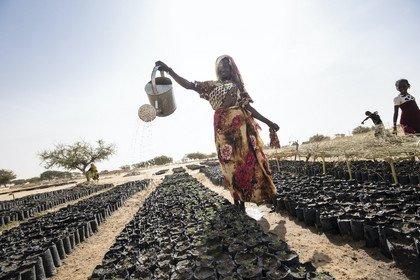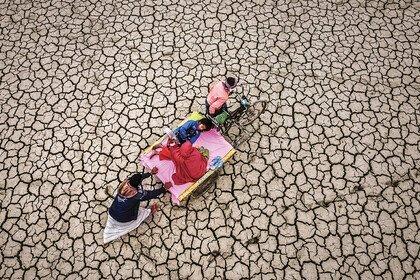
COP27 and the focus on 1.5 degrees Celsius
Alice Bell, Head of Climate and Health Policy at Wellcome, shares her reflections on COP27 and how health research can be transformative for climate policy.

Sean Gallup/Getty Images
At the close of COP27, UK MP Alok Sharma reached for a medical metaphor: “Friends, I said in Glasgow [last year] that the pulse of 1.5 degrees was weak. Unfortunately, it remains on life support.” Behind that abstract number sits a salient political point.
COP27 did have some successes. We saw a reference to “the right to a clean healthy and sustainable environment” (key for us at Wellcome). More nations joined a pledge on methane emissions (because the crisis isn’t just a carbon problem). A historic agreement was reached to fund loss and damage (support for places suffering impacts of climate change beyond what anyone can adapt to).
But COP27 fell short on something very basic – keeping greenhouse emissions low enough that we might keep average global temperatures to below 1.5 degrees Celsius above where they were in the mid-nineteenth century.
How did we get to 1.5 degrees Celsius?
To give Sharma’s number some context, we were at about a third of a degree warming in the late 1930s, back when climate science pioneer Guy Callendar first ran the maths. We’ve been continuing to inch up ever since, passing the one degree threshold in 2017, enough to fuel the dramatic weather events we saw around the world this summer.
Crucially, these degrees of heating aren’t evenly distributed. By referring to the neat global average for the entire year, we gloss over a host of extreme weather events that hit some parts of the world worse than others. Plus, some people can afford to protect themselves more than others.
When politicians like Sharma use rhetoric like 1.5 having a “pulse”, they add emotion to an otherwise dry bit of abstract science, but we shouldn't need such metaphors. The emotions are already there. Because on the ground, climate policy isn’t just about keeping a campaign message alive. It’s about saving actual lives; real lives, not metaphorical ones.
"We could be talking less about degrees Celsius and more about the number of people we could save, where and how, right now."
Saving lives, not Celsius
If we're feeling cynical, we might argue something as abstract as degrees Celsius serves those who’d rather we keep conversations away from actual lives or practicalities, like how polluting cars and planes are, what we eat and buy (and throw away), how much energy costs (and who profits) or where we build wind turbines (or don’t).
Cynicism aside, talking about climate change by degrees is challenging for campaigners, having to push the importance of keeping to 1.5 whilst also stressing that all is not lost if we don't. 1.6 is still better than 1.7, and 1.7 is better than 1.8, and ultimately these are all just numbers of a human-designed scale. Climate advocates could save themselves a lot of stress by talking about the impact of climate on human health, because climate change is already a life and death issue. No poetry needed, only better health research.
In 2022, climate policy isn’t just about stopping some future climate change but dealing with impacts we already have. We’d be much better off talking about numbers of people put at risk, where, and how climate change is already painfully impacting lives. Or, to put a more positive spin on it, we could be talking less about degrees Celsius and more about the number of people we could save, where and how, right now.
Loss and damage and maladaptation
Health research can have a transformative impact on more than just politicians' climate rhetoric. The topic of loss and damage was one of the hottest of this year's COP – indeed, it’s been a hot topic all year – and is only going to get more heated in future COP talks as delegates fight over who will pay. If we’re going to have a full and detailed conversation about what loss and damage actually looks like, and who is hit the hardest, we need health researchers.
Another hot topic in climate policy is ensuring that the transition away from fossil fuels and protection of natural absorbers of carbon like forests isn’t just done at speed, but that it’s done fairly and safely, too. To do that, we’re going to need to assess policies for the health risks they might pose and evaluate any unintended health impacts.
As the most recent IPCC reports noted, there’s also increasing concern about something called “maladaptation” – when you try to adapt to climate change but create or exacerbate other problems in the process. Again, one of the tools we need against maladaptation is health research. Financial and carbon accounting alone only gets us so far. We need health research to help us navigate the climate policy options (and we do still have options). Without a health take on climate policy, humanity simply won’t have a full picture of the crisis, or how we’ll best solve it.
Putting health at the heart of climate policy
In 2023 and beyond, Wellcome will be working hard to make the case that health needs to be at the heart of all climate action. That involves climate people inviting us to their party, but also health people turning up too (crashing the odd climate party, if we must).
Just as it’s become hard to have a conversation about energy without climate change and vice versa, climate and health need to get used to talking about and to each other. And just as health policy looks increasingly silly if it doesn't mention the giant, looming climate crisis, we simply won’t have good climate policy without health voices in the room.


